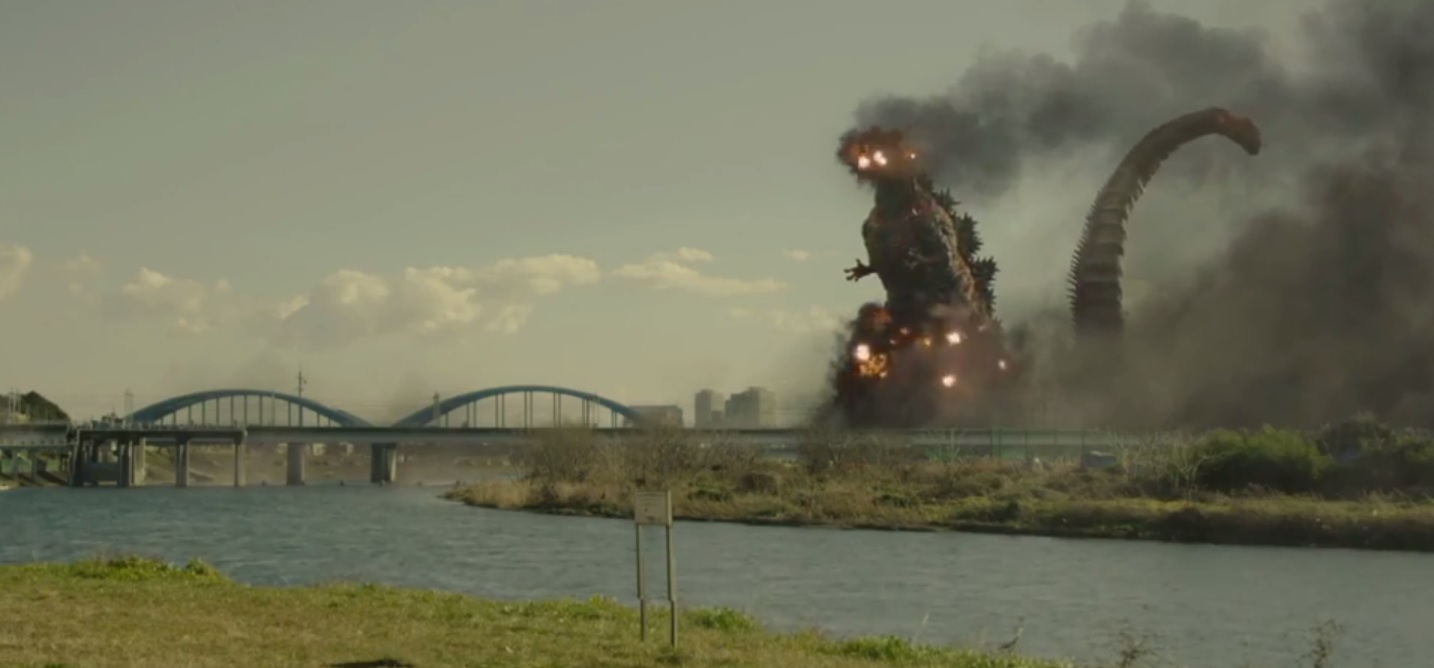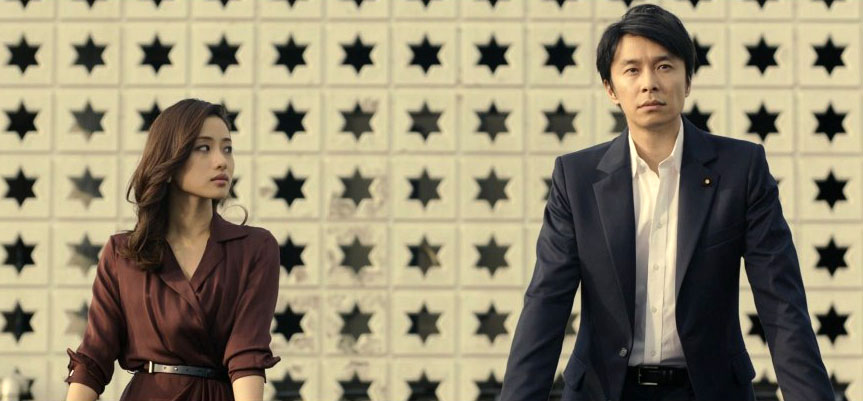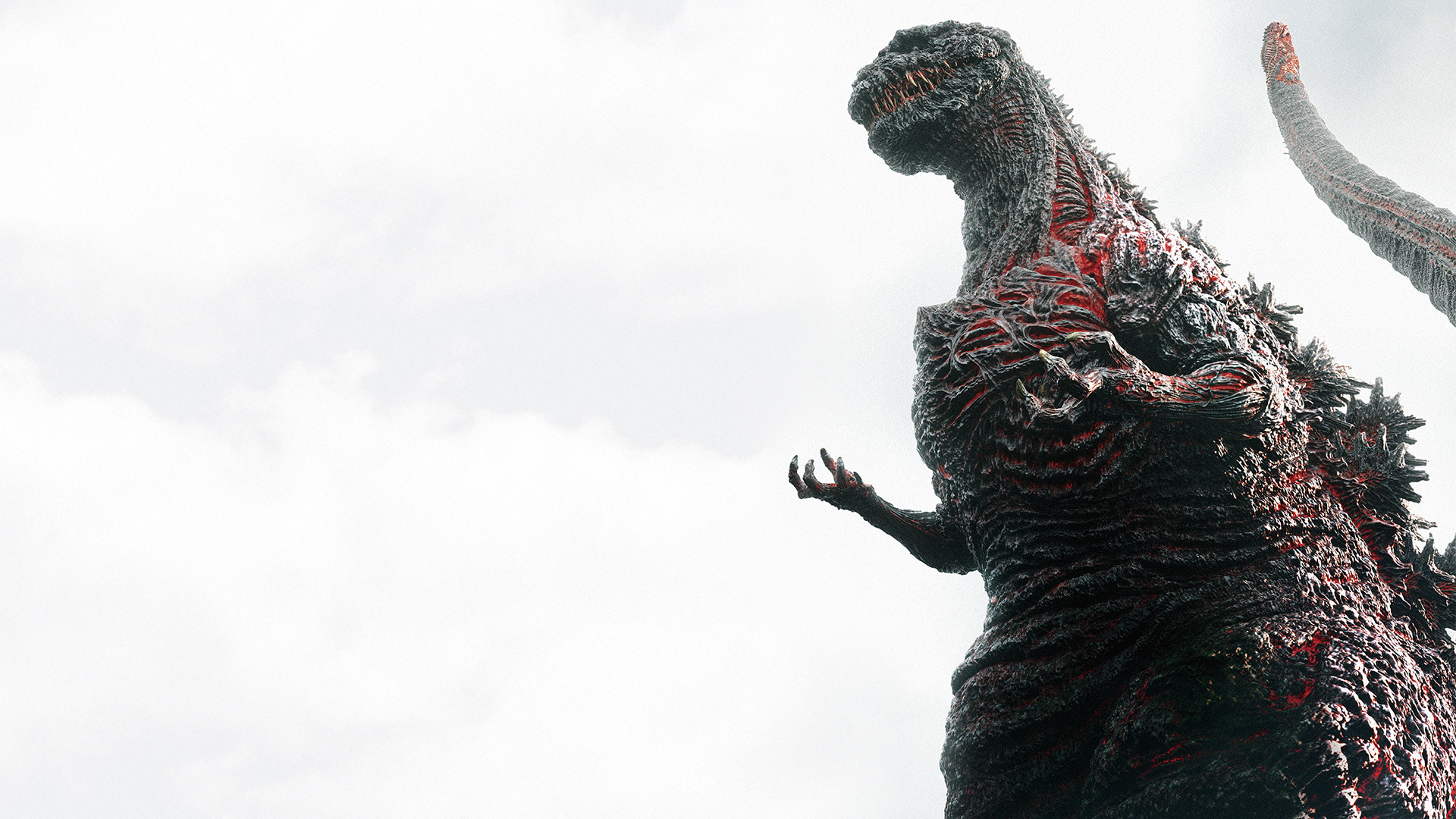Shin Godzilla is Toho’s 29th film featuring a nuclear abomination known around the world. With Gareth Edwards’ 2014 contribution – the aptly named Godzilla – still fresh in audiences’ minds, I was initially curious how Hideaki Anno and Shinji Higuchi (known for work on the series Neon Genesis Evangelion) would introduce a different form of the atomic-breathing lizard.
In some ways, the differences between Shin Godzilla and Godzilla point out the nuances of the kaiju genre and how the same idea – that of giant monsters – might be dealt with through markedly different forms. In other ways, however, this simply points out how symptomatic Western appropriation is in, well, missing the entire point of what Godzilla represents as a concept.
 In its earliest moments, Shin Godzilla reminds us of the allegorical qualities of its original predecessor (I’m talking more about Ishiro Honda’s 1954 film than I am, say, the more monster-heavy films that followed after). Here we have a take on the Fukushima Daiichi nuclear disaster from 2011 which undeniably is still fresh in the minds of Japanese viewers.
In its earliest moments, Shin Godzilla reminds us of the allegorical qualities of its original predecessor (I’m talking more about Ishiro Honda’s 1954 film than I am, say, the more monster-heavy films that followed after). Here we have a take on the Fukushima Daiichi nuclear disaster from 2011 which undeniably is still fresh in the minds of Japanese viewers.
If the 1954 Godzilla was a representation of nuclear warfare, then 2016’s Shin Godzilla is a statement of nuclear’s creeping threat upon society. In other words, this is a film which near slaps the viewer in the face asking, “Why would we put so much faith in a power so dangerous?” and “Have we forgotten about the threat of nuclear energy?”

This is indicative of Hideaki Anno and Shinji Higuchi’s strengths from their previous work. Their work with Evangelion challenged the way a kaiju story might be told, using anime as the medium. Instead of focusing on some glorification of action and mayhem, the series was a character-based story which brought questions of identity and existentialism to the forefront all blanketed in the way a government might react to the threat of giant monsters. Using the complexities of their previous work as a model, it’s clear these two are not interested in telling stories of destruction from a blockbuster-type angle and are instead more vested in sending a message to their viewers.
I bring this up because early reviews for the film paint Shin Godzilla as a near-theatrical version of Evangelion, and while this comparison is appropriate, I believe there’s a stronger case to believe that this stands more as what a Godzilla film is meant to be than anything else. Sure, the directors’ fingerprints leave a mark in that the film shares the same grotesque imagery and government-based focus mixed with self-aware humor as their other work, but then again, shouldn’t we allow a series this old to be told through different lenses? And, more importantly, wasn’t Godzilla always a smarter story than we believed?

From my standpoint, one of the most exciting aspects of Shin Godzilla is not only its devotion to being a classic allegory but the way in which it remains upfront about the story we’re being shown. Godzilla is seen very early in the film emerging from the sea as an infant, and, as the film goes on, we are given a few visuals that track the monster’s development until finally seeing its radioactive blast. But none of this comes strung together.
Much like Edwards’ 2014 film, Anno and Higuchi keep Godzilla behind the curtain for most of the story. Only the difference is that this is not marketed as a blockbuster film. Translation: I was happy to see the monster treated this way because it contributed to a smarter, more successful representation of the subject matter versus a disappointing striptease from a ferocious, scaled beast.
Likewise, there aren’t many boring narratives to contend with, as much of the film presents a satirical view of the Japanese government in drafting a statement for how it handled the 2011 disaster. For example, older members of the cabinet fail to react appropriately to Godzilla’s arrival and, as such, are the source for continued disaster and destruction – much like the delayed response from the government in 2011. It is the younger representative, Rando Yaguchi (played by Hiroki Hasegawa), who challenges this bureaucracy and offers a less violent approach to deal with Godzilla – one which ultimately serves the best interests of Japan and the nation’s people.
Yaguchi proves to be a voice of reason throughout the narrative as he relies on information provided by a US-envoy, Kayoko Ann Patterson (played by Satomi Ishihara), to learn more about the creature and stop it through clever planning versus continued bombing. It is his arguing and his sense of purpose which inevitably keeps the U.S. from dropping a third nuclear bomb on the country – a development which, again, drives home the message of a nuclear disaster looming on the horizon.
I feel it’s worth mentioning that Yaguchi’s screentime felt justified in a way that the characters of the 2014 film did not. I cared more about his success because I identified the real events inspiring his story and, more than this, there was a real sense of dread shared amongst the characters which I did not feel was present in the U.S. version of the story. This wasn’t necessarily the same pedestrian perspective of the 2014 film, given that this film relied on a more governmental look at the issue. As such, the questions that come up in thinking of solutions to Godzilla feel as though they have weight and everything feels more calculated. Placing a pedestrian-type character at the forefront has the opposite effect – where Shin Godzilla told you where it was going, Edwards’ film made a more bombastic approach and at times felt like the kind of shoot-first, ask short-winded questions later type story that creates less of an intellectual resonance.

In short, you can say that this film brought back a sense of philosophy to Godzilla as more of a concept than a creature. And while I’m not sure if this will be the best or most marketable approach for those fans of the ’70s and ’80s monster kaiju flicks, I do know this indicates that there is still a way to poetically tell a story about an idea so ludicrous in practice. Because as funny or outlandish as the idea is, Godzilla is still terrifying when it best captures the fear of a memorable disaster or impending doom.
This was a series that was never meant as a celebration of anything, really. It’s always been more a narrative of mankind’s mistakes and how they come back in monstrous ways.
Wrapping up: I encourage viewers to check this film out and develop your own ideas on it because I believe there are still some components I may have missed in my first viewing. For instance, in revisiting the imagery of the Fukushima disaster after the fact, much of the imagery from the film comes to mind. There are moments in which photographed chaos is near-identical to how the disaster was broadcasted years ago. I believe that knowing this makes some of the film’s finer details all the more chilling or threatening.
Shin Godzilla
2016
dir. Hideaki Anno & Shinji Higuchi
120 min.
Now playing (sporadically) at Regal Fenway and Kendall Square Cinema – check websites for showtimes.

